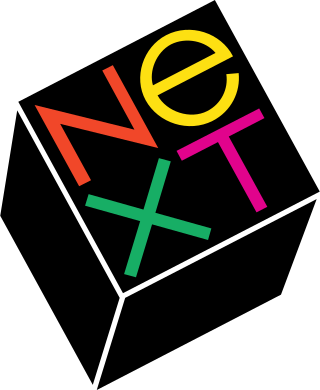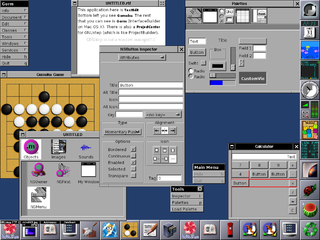
NeXTSTEP is a discontinued object-oriented, multitasking operating system based on the Mach kernel and the UNIX-derived BSD. It was developed by NeXT Computer, founded by Steve Jobs, in the late 1980s and early 1990s and was initially used for its range of proprietary workstation computers such as the NeXTcube. It was later ported to several other computer architectures.
Darwin is the core Unix operating system of macOS, iOS, watchOS, tvOS, iPadOS, visionOS, and bridgeOS. It previously existed as an independent open-source operating system, first released by Apple Inc. in 2000. It is composed of code derived from NeXTSTEP, FreeBSD, other BSD operating systems, Mach, and other free software projects' code, as well as code developed by Apple.

OpenStep is an object-oriented application programming interface (API) specification developed by NeXT. It provides a framework for building graphical user interfaces (GUIs) and developing software applications. OpenStep was designed to be platform-independent, allowing developers to write code that could run on multiple operating systems, including NeXTSTEP, Windows NT, and various Unix-based systems. It has influenced the development of other GUI frameworks, such as Cocoa for macOS, and GNUstep.
Cocoa is Apple's native object-oriented application programming interface (API) for its desktop operating system macOS.

GNUstep is a free software implementation of the Cocoa Objective-C frameworks, widget toolkit, and application development tools for Unix-like operating systems and Microsoft Windows. It is part of the GNU Project.
Carbon was one of two primary C-based application programming interfaces (APIs) developed by Apple for the macOS operating system. Carbon provided a good degree of backward compatibility for programs that ran on Mac OS 8 and 9. Developers could use the Carbon APIs to port (“carbonize”) their “classic” Mac applications and software to the Mac OS X platform with little effort, compared to porting the app to the entirely different Cocoa system, which originated in OPENSTEP. With the release of macOS 10.15 Catalina, the Carbon API was officially discontinued and removed, leaving Cocoa as the sole primary API for developing macOS applications.
Portable Distributed Objects (PDO) is an application programming interface (API) for creating object-oriented code that can be executed remotely on a network of computers. It was created by NeXT Computer, Inc. using their OpenStep system, whose use of Objective-C made the package very easy to write. It was characterized by its very light weight and high speed in comparison to similar systems such as CORBA.

WebObjects is a discontinued Java web application server and a server-based web application framework originally developed by NeXT Software, Inc.
Apple events are the message-based interprocess communication mechanism in Mac OS, first making an appearance in System 7 and supported by every version of the classic Mac OS since then and by macOS. Apple events describe "high-level" events such as "open document" or "print file", whereas earlier OSs had supported much more basic events, namely "click" and "keypress". Apple events form the basis of the Mac OS scripting system, the Open Scripting Architecture.

Rhapsody is an operating system that was developed by Apple Computer after its purchase of NeXT in the late 1990s. It is the fifth major release of the Mach-based operating system that was developed at NeXT in the late 1980s, previously called OPENSTEP and NEXTSTEP. Rhapsody was targeted to developers for a transition period between the Classic Mac OS and Mac OS X. Rhapsody represented a new and exploratory strategy for Apple, more than an operating system, and runs on x86-based PCs and on Power Macintosh.

AppKit is a graphical user interface toolkit. It initially served as the UI framework for NeXTSTEP. Along with Foundation and Display PostScript, it became one of the core parts of the OpenStep specification of APIs. Later, AppKit and Foundation became part of Cocoa, the Objective-C API framework of macOS. GNUstep, GNU's implementation of the OpenStep/Cocoa API, also contains an implementation of the AppKit API.
Core Foundation is a C application programming interface (API) written by Apple Inc. for its operating systems, and is a mix of low-level routines and wrapper functions. Most Core Foundation routines follow a certain naming convention that deal with opaque objects, for example CFDictionaryRef for functions whose names begin with CFDictionary, and these objects are often reference counted (manually) through CFRetain and CFRelease. Internally, Core Foundation forms the base of the types in the Objective-C standard library and the Carbon API.
In the macOS, iOS, NeXTSTEP, and GNUstep programming frameworks, property list files are files that store serialized objects. Property list files use the filename extension .plist, and thus are often referred to as p-list files.
In NeXTSTEP, OPENSTEP, and their lineal descendants macOS, iOS, iPadOS, tvOS, and watchOS, and in GNUstep, a bundle is a file directory with a defined structure and file extension, allowing related files to be grouped together as a conceptually single item.
PyObjC is a bidirectional bridge between the Python and Objective-C programming languages, allowing programmers to use and extend existing Objective-C libraries, such as Apple's Cocoa framework, using Python.
The term target–action design paradigm refers to a kind of software architecture, where a computer program is divided into objects which dynamically establish relationships by telling each other which object they should target and what action or message to send to that target when an event occurs. This is especially useful when implementing graphical user interfaces, which are by nature event-driven.
Cocoa Touch is the application development environment for building software programs to run on iOS for the iPhone and iPod Touch, iPadOS for the iPad, watchOS for the Apple Watch, and tvOS for the Apple TV, from Apple Inc.
Objective-C is a high-level general-purpose, object-oriented programming language that adds Smalltalk-style messaging to the C programming language. Originally developed by Brad Cox and Tom Love in the early 1980s, it was selected by NeXT for its NeXTSTEP operating system. Due to Apple macOS’s direct lineage from NeXTSTEP, Objective-C was the standard programming language used, supported, and promoted by Apple for developing macOS and iOS applications until the introduction of the Swift programming language in 2014.
The Cocoa text system is the linked network of classes, protocols, interfaces and objects that provide typography and text field editing capabilities and to Cocoa applications on Apple's macOS, where it is the primary text-handling system. Although "extremely complex", the standard text-handling abilities of the Cocoa text system have been widely praised as without peer. It is possible to implement a fully featured rich text editor in only a few lines of code.





